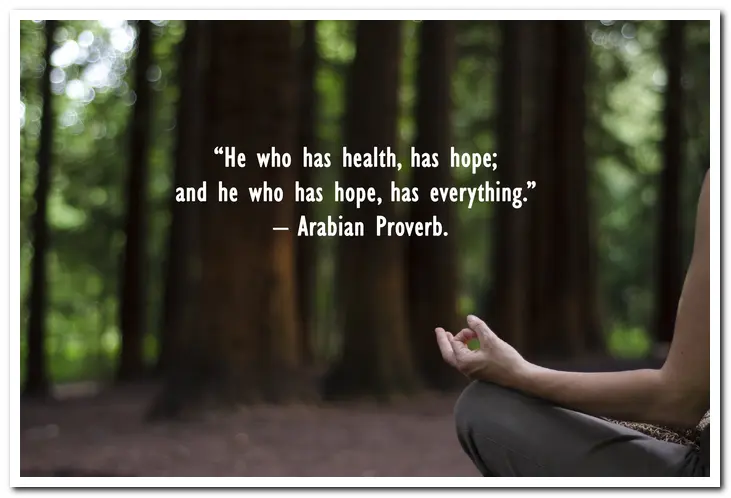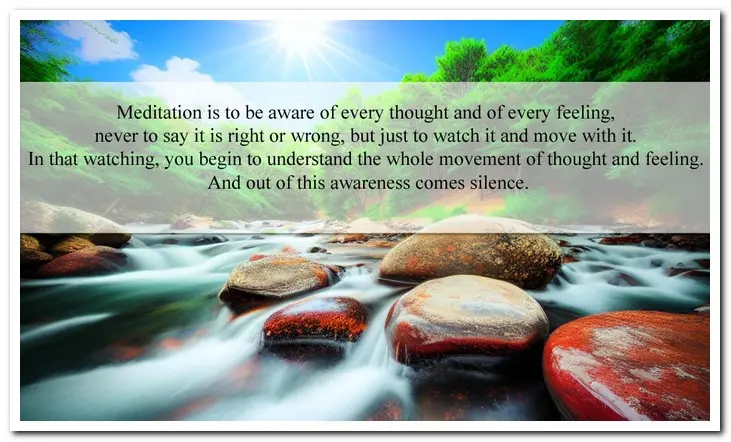Meditation Incorporated into Treatment for Substance Abuse
Meditation has been a valuable tool for holistic recovery programs. It can help people feel calm, reflect on the past, plan for the future, cope with triggers, and avoid relapses. Meditation will also help the individual reduce stress, withdrawal symptoms, anxiety, ADHD, and PTSD symptoms.What type of programs use meditation as part of their curriculum?
We have found that all types of rehabs allow for independent meditation time through free time or daily reflection. These times can be allotted by you, for meditative practices. Suppose you are looking for a program that incorporates meditation into its curriculum. In that case, we have found that holistic rehab center programs and secular rehab centers are more accommodating to meditative practices and may have therapists to guide you.
He who has health has hope and he who has hope has everything. Arabian Proverb
Meditation Therapy used for Substance Abuse
Meditation can have many benefits when used for substance abuse therapy. It has been shown to help greatly when people use these practices to combat symptoms of withdrawal, cravings, and the triggers that can lead to relapse. Meditation can also help combat mental health concerns including:*Reduced stress
*Improved mood
*Reduced PTSD, and ADHD symptoms
*Improved emotional stability
*Reduced brain activity
*Improves mood
*Improved concentration
*Reduced depression and anxiety
*Risk of relapse is reduced
*Decreased insomnia
*Increased focus
*Increased flexibility
6 types of Meditation for Addiction Recovery
When you enroll in a program that offers meditation as part of the curriculum you may encounter several different types of meditative practices. The most common practices can include some or all of the 6 different types we have listed below.1. Mindfulness Meditation is the practice of being self-aware of your feelings and thoughts while allowing them to flow freely without judgment, preconception, or engagement. This form of meditation is most commonly practiced with the individual in a peaceful, quiet setting while sitting in a comfortable position.
2. Breathwork meditation is a form of meditation that has you sit in a comfortable position with your eyes closed. As you breathe you concentrate on your breaths as you inhale or exhale. As you breathe you are concentrating on each individual breath as you relax your muscles and body. If you feel yourself starting to have a wandering mind focus your mind back to your breathing. This type of meditation helps the individual develop a feeling of inner peace and a calm mind.
3. Guided meditation is done with another person specifically trained in guided meditation. The facilitator will guide you through visualization exercises while you are sitting in a comfortable position. You will be asked to breathe deeply and slowly to help you relax while you are guided through scenarios to feel various states of happiness, growth, peace, or connection. Guided meditation will make it easier for you to explore your feelings, thoughts, and reactions. Guided meditation can be done through videos or in person with a facilitator.
4. Moving meditation is one of the few meditative practices that does not involve sitting. While in a mindful state of meditation, you focus on your movement while paying attention to your surroundings. You can practice this in your own home, garden, park, or in a forest. Find an activity you enjoy like flying kites, yoga, Tai Chi, or just go for a walk. Focus on your movements and how they feel flowing through your body. Pay attention to the sounds around you that your senses are receiving, like the sounds of the birds, wind, crashing waves, or the smell of the flowers. Moving meditation can be particularly helpful for those who find it hard to sit still and quiet their minds.
5. Zen meditation is a Buddhist practice that involves delving into the mind while observing and letting go of thoughts and feelings that come up in the midstream. You sit in a comfortable position while adopting slow and deep breathing patterns, in which the breathing rate can be reduced to a few breaths a minute. Common practice is to count your inhales and exhales up to ten then start over. If a thought enters your midstream mentally acknowledge it, then let it go and continue counting your breaths starting with one. Every time you have drifted away from the mind and returned to the breath; you are developing an important aspect of mindfulness.
6. Mantra meditation is a form of meditation where the person practicing the art focuses on a sound, phrase, or word to focus the mind and promote relaxation. Focusing your thoughts on a simple task you allow your worries and anxiety to fade away.

Meditation is to be aware of every thought and of every feeling, never to say it is right or wrong, but just to watch it and move with it. In that watching, you begin to understand the whole movement of thought and feeling. And out of this awareness comes silence.
Is meditation actually beneficial in recovery from a substance abuse disorder?
There have been many studies that have been conducted on this very topic. It has been found that meditation absolutely helps in the recovery process. Meditation was used as part of several different programs across many different addictions including opioids, alcohol, tobacco, and polysubstance abuse disorders. The results were positive across the board specifically in these areas: preventing relapse, gaining awareness of substance use patterns, decreasing stress reactivity, restructuring reward, and promoting cognitive control over automaticity.To learn more or to find a holistic treatment center near you that offers meditation therapy call now.
1-800-513-5423
SourcesMindfulness Meditation
How To Meditate: Zazen Instructions
Erik Epp – Content Author



